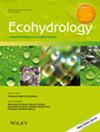Microbial metabolism in aerobic conditions releases carbon dioxide into the groundwater in the aquifer, while carbon dioxide controls the dissolution/precipitation of calcite and the hydration reaction under field conditions. Higher microbial activity produces more adenosine triphosphate (ATP) and vice versa. In this study, to elucidate the effect of groundwater flow on microbial activity in porous limestone groundwater, the relationship between water chemistry and ATP as a microbial activity index was investigated in groundwater in the Ryukyu limestone groundwater reservoir on Yoron Island, a subtropical island in southwestern Japan. The results in groundwater of a porous limestone groundwater reservoir suggest that (1) microbial activity caused by floating microorganisms in natural groundwater flow depends on dissolved oxygen and reflects that the calcite dissolution/precipitation behaviour and the hydration reaction proceed and (2) fast-flowing groundwater flow induced by artificial pumping suppresses the microbial activity caused by floating microorganisms in groundwater, despite the introduction of sufficient dissolved oxygen necessary for metabolism, and reduces the links between the microbial activity in groundwater and water-rock interaction.


